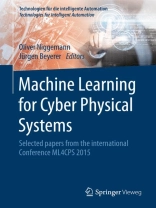The work presents new approaches to Machine Learning for Cyber Physical Systems, experiences and visions. It contains some selected papers from the international Conference ML4CPS – Machine Learning for Cyber Physical Systems, which was held in Lemgo, October 1-2, 2015.
Cyber Physical Systems are characterized by their ability to adapt and to learn: They analyze their environment and, based on observations, they learn patterns, correlations and predictive models. Typical applications are condition monitoring, predictive maintenance, image processing and diagnosis. Machine Learning is the key technology for these developments.
สารบัญ
Development of a Cyber-Physical System based on selective dynamic Gaussian naive Bayes model for a self-predict laser surface heat treatment process
control.- Evidence Grid Based Information Fusion for Semantic Classifiers in Dynamic Sensor Networks.- Forecasting Cellular Connectivity for Cyber-
Physical Systems: A Machine Learning Approach.- Towards Optimized Machine Operations by Cloud Integrated Condition Estimation.- Prognostics Health
Management System based on Hybrid Model to Predict Failures of a Planetary Gear Transmission.- Evaluation of Model-Based Condition Monitoring Systems in Industrial Application Cases.- Towards a novel learning assistant for networked automation systems.- Effcient Image Processing System for an Industrial Machine Learning Task.- Efficient engineering in special purpose machinery through automated control code synthesis based on a functional categorisation.- Geo-Distributed Analytics for the Internet of Things.- Imple
mentation and Comparison of Cluster-Based PSO Extensions in Hybrid Settings with Efficient Approximation.- Machine-specifc Approach for Automatic Classifcation of Cutting Process Efficiency.- Meta-analysis of Maintenance Knowledge Assets Towards Predictive Cost Controlling of Cyber Physical Production Systems.- Towards Autonomously Navigating and Cooperating Vehicles in Cyber-Physical Production Systems.
เกี่ยวกับผู้แต่ง
Prof. Dr. Oliver Niggemann ist seit November 2008 Mitglied des in IT. Er vertritt das Fachgebiet Embedded Software Engineering in der Lehre und forscht im in IT in den Bereichen Verteilte Echtzeit-Software und der Analyse und Diagnose verteilter Systeme. Gleichzeitig forscht Prof. Niggemann im Fraunhofer-Anwendungszentrum Industrial Automation (INA) in Lemgo.
Prof. Dr.-Ing. Jürgen Beyerer ist in Personalunion Inhaber des Lehrstuhls für Interaktive Echtzeitsysteme an der Fakultät für Informatik und Leiter des Fraunhofer IOSB. Die Schwerpunkte in Forschung und Lehre am Lehrstuhl für Interaktive Echtzeitsysteme liegen auf den Themen: automatische Sichtprüfung und Bildauswertung, Mustererkennung und Signal- und Informationsverarbeitung.












